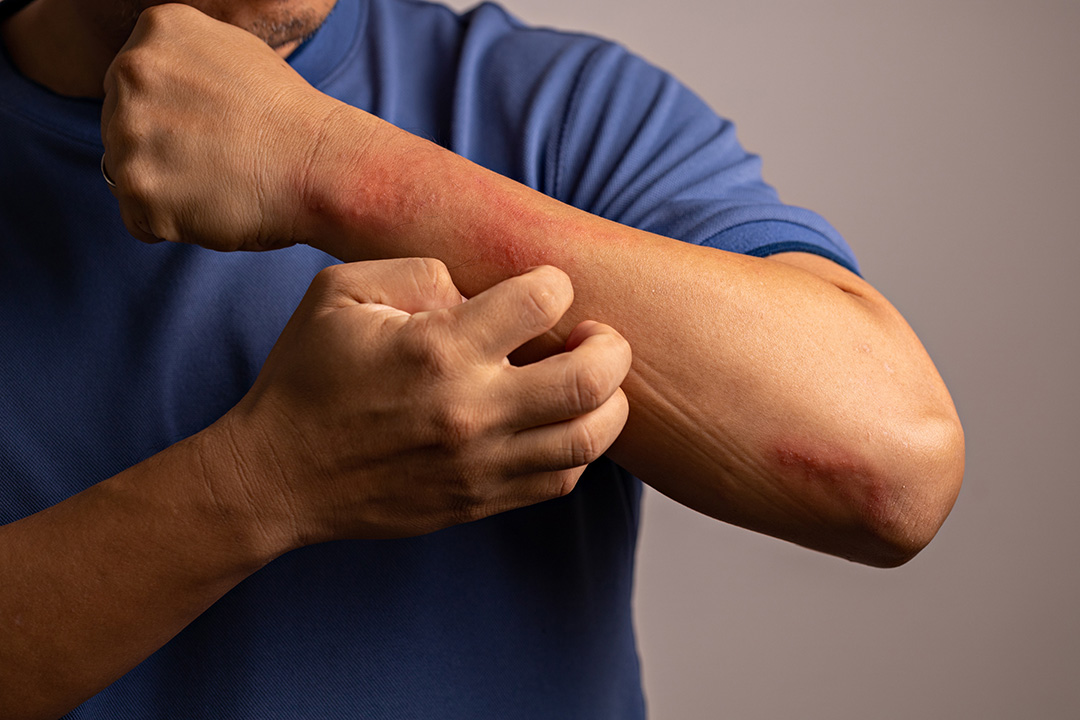Adult Eczema: Understanding and Managing with Self-care

Eczema is a chronic skin disorder that can take a physical and mental toll on those who are afflicted with it. Despite its common association with childhood, eczema can manifest itself in adulthood, affecting at least 1 in every 10 adults globally. This underscores the importance of understanding and managing this prevalent skin disease.
But what exactly causes adult-onset eczema? Can certain foods trigger them? How can one manage troublesome flare-ups? If you or someone you know is dealing with eczema, read on to learn more as we explore common questions and truths behind this troubling skin condition.
What causes adult eczema?
Eczema, also known as atopic dermatitis, is characterised by dry, red, itchy rashes that often appear on areas like the face, flexures, hands, feet, and even the scalp. It can affect individuals of all ages. Some people experience eczema only during their childhood or have it recur later in life, while others may develop it for the first time as adults.
Although there is no exact cause for adult eczema, it can be triggered by a combination of factors, such as:
Genetics
Individuals with a family history of eczema or allergies are more likely to develop this condition.
Environment
Irritants such as exposure to air pollutants, heat and humidity, harsh soaps and detergents, skincare products, or even certain fabrics, can trigger eczema.
Immune System
As we age, our immune system undergoes changes, which can influence how our body reacts to allergens and irritants. These changes can sometimes trigger the onset of eczema.
Stress
Emotional stress, anxiety, or depression may cause more frequent eczema flare-ups.
Can certain foods trigger eczema?
While food itself does not directly cause eczema, certain foods can exacerbate it. You should consult a dermatologist for a thorough assessment if unsure.
In contrast, an anti-inflammatory diet containing foods like salmon, apples, spinach, yogurt, and turmeric may be beneficial for eczema-prone skin. Staying well-hydrated by drinking plenty of water may also promote healthier skin and reduce the frequency of flare-ups.
Is eczema contagious?
As eczema is not the same as viral or bacterial conditions that can be transmitted, it is not possible to contract eczema from someone who has it.
How to manage eczema flare-ups?
With eczema, your skin barrier weakens, leading to a never-ending cycle of dryness, irritation, and inflammation. Strengthening the skin barrier and avoiding triggers should therefore be the key priority in preventing further episodes.
Here are some self-care tips and measures that will help manage eczema flare-ups and minimise their occurrence:
Use mild soap: Opt for unscented, mild soaps that are suited for sensitive skin. Also, avoid hot water during showers as it will strip your skin of natural oils.
Avoid scratching: While it can be unbearably hard to resist, scratching should be your last resort. Instead, apply a cool compress or ice pack to your skin to help relieve those itches. Keep your nails short or wear mittens while sleeping.
Wear breathable fabrics: Reduce irritation by wearing non-scratchy, lightweight fabrics such as smooth-textured cotton. This also allows your skin to breathe and helps prevent excessive sweating during humid weather.
Wet wrap therapy: Known as an effective way to relieve flare-ups, this involves applying moisturiser or medication to your inflamed skin, covering it with a moist bandage, and then adding another layer of dry cloth.
Get prescription medications: Depending on the severity, your dermatologist may prescribe oral or topical corticosteroids, antihistamines, or topical calcineurin inhibitors to help reduce inflammation and itchiness.
Will eczema go away on its own?
While eczema is not curable, breaking free from the itch-scratch cycle is possible. With the right skincare routine, dietary change, and lifestyle adjustments, many adults have managed to regain control and lead normal lives.
If eczema is significantly disrupting your daily life, a dermatologist can provide a personalised treatment plan for your troubling skin. Dealing with eczema may be challenging, but remember, you can improve your skin by making small changes along the way.
This article is reviewed by Dr Chris Foo, Specialist in Dermatology and Consultant, Raffles Skin & Aesthetics.





















